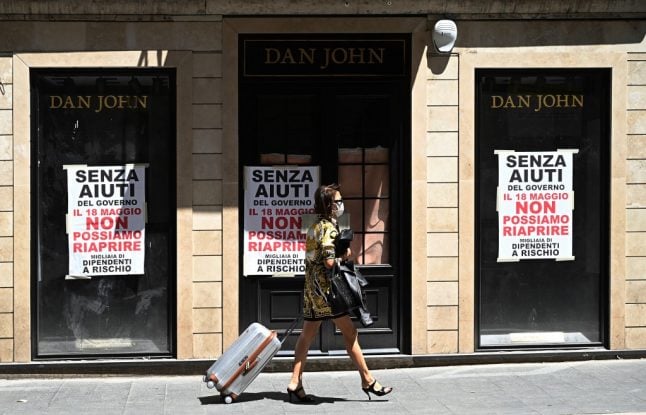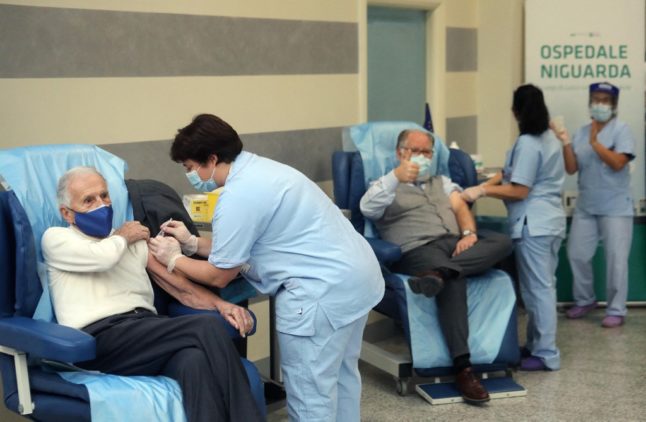Business confidence in the eurozone's third largest economy in May plummeted to its lowest level since official statistics institute ISTAT started the index in March 2005.
The figure is “alarming”, said small business federation Confesercenti.
“The health and economic emergency has swept businesses away, especially in shops, services and tourism,” it said.
Its members are particularly concerned “by the lack of liquidity necessary to pay costs and salaries… we are close to a point of no return and that's why the measures decided by the government (loan guarantees, SME subsidies) must be operational immediately,” said federation head Patrizia De Luise.
“We need to reduce bureaucracy and accelerate and simplify procedures, because if support is delayed again, many businesses will have no option but to stop,” she said.

Storekeepers asking for the reopening of shops and commercial activities gather for a flashmob protest outside the Santa Lucia railway station by the Grand Canal in Venice, May 03, 2020. MARCO SABADIN / AFP
The government last week accused banks of not acting quickly enough, but they said that they had already passed on around 400,000 loan requests worth more than 18 billion euros ($20 billion) to the state-backed Central Guarantee Fund.
A million jobs threatened
Italy was the first European country to be hit by the pandemic and imposed a strict two-month lockdown which paralysed much of the country's economic activity.
As a result, the country is set for a drop in GDP of between nine and 13 percent, the Bank of Italy said on Friday.
Data also showed that the economy shrank 5.3 percent in the first quarter — worse than the 4.7 percent initially estimated. It had not seen such an “exceptional” decline in the first quarter since 1995, ISTAT said.
This year's losses could amount to 170 billion euros, equivalent to the GDP of Veneto, Italy's third biggest industrial region, a Mediobanca study said.
The head of the country's main business confederation Cofindustria, Carlo Bonomi, said that up to a million jobs could be threatened nationwide.
“We're waiting for figures at the end of May but indications are that between 700,000 and a million jobs are in danger,” he said.
“Jobs are only created if there is growth, innovation, investment. The car manufacturing crisis can't be solved with subsidies or furloughing. You solve it by looking to the future, by investing in new technologies,” he said.
Italy is set to be the main beneficiary of a European Union 750-billion-euro recovery plan but it still may not be enough.

A hairdresser takes part in a flashmob protest of storekeepers asking for the reopening of shops and commercial activities, on the Rialto Bridge overlooking the Grand Canal in Venice on 03 May 2020. MARCO SABADIN / AFP
No aid
Italian citizens are slightly more optimistic, but far from celebrating. The pandemic has killed over 30,000 people.
Consumer confidence went from 100.1 points in May to 94.3 in March, its lowest level since December 2013.
While the state has paid for furloughs or handouts for those no longer able to work, many have slipped through the net.
They include Eleonora Fogliacco, 35, a fitness and swimming teacher in Lombardy, the hardest hit region where gyms were ordered closed at the end of February.
“I didn't qualify for the 600-euro monthly government handout because I earned more than 10,000 euros last year,” she told AFP.
“During the crisis I had peaceful days and days when I felt completely lost, without any state help. I could no longer see the future and I didn't know what to hold onto,” she said. “I don't buy anything. I depend on my partner for the shopping,” said Fogliacco.
“This situation has changed everybody's way of life (and) everything will be very complicated” in the future, she added.
According to a Confcommercio-Censis poll published on Tuesday, 53 percent of Italian families see their future negatively and 68 percent see the country's future negatively.
Because of lockdown, 42 percent of families have had to reduce their work and income, 26 percent have stopped work and 24 percent have been furloughed.
Six out of 10 families fear losing a job, as a result of which 28 percent have decided to take no holidays nor long weekends.



 Please whitelist us to continue reading.
Please whitelist us to continue reading.
Member comments